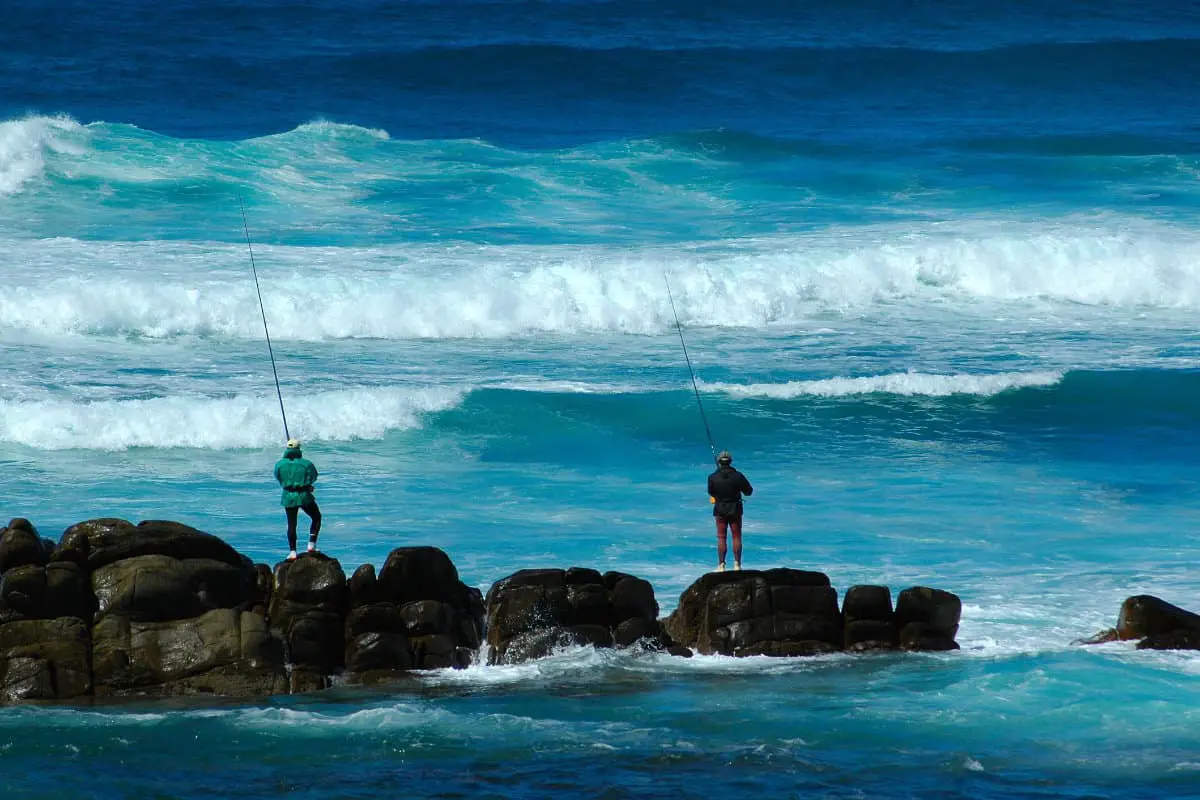Fishing is a craft of many skills, which always makes it interesting and challenging, but it can also make it hard to understand why you’re not catching the fish you wanted. That’s an annoying problem! And anything could be the cause.
The good news is that’s not the case.
Keep reading to find out the most common reasons why your targeted fish isn’t biting. At the very least, our list can help you narrow down the potential problem.
1. You’re Too Loud
Before we get to the more technical reasons why you can’t catch your target fish, let’s take care of a few factors that aren’t technical.
This first factor is surprisingly common, especially for boatmen who use their motorized boats to get to promising fishing spots.
Noise from you, your party, or your equipment affects your fishing as fish sense it underwater through two organs. One is the otolith that’s in both their inner ears.
The other is called the lateral line, which runs on either side of a fish from top to bottom.
If you’re too loud, you can risk startling the fish, not necessarily because the volume is high, but because minor vibrations can disturb their highly acute sensory organs.
2. There’s a Cold Front Coming
Some non-technical factors are beyond your control. A cold front is dreaded among angler fishermen because there’s nothing they can do about it, and it can cease any fishing until it passes over.
The day of a cold front and the day after heavily affects the activity of the fish. Fish are cold-blooded, so whatever the temperature of the water![]() they’re in is, they will be.
they’re in is, they will be.
When water is warm, fish are much more active and biting like crazy, but when the water is cold, such as during and after a cold front, they slow down to almost a standstill.
It’s possible to catch fish during a cold front, but it can be more difficult. Other times, it can improve fishing if it follows heavy rainfall, but it depends on what you’re fishing.
3. The Day is Too Bright.
This is one reason why fishing is usually done in the early morning or late evening. Fish are sensitive to light, especially if you are fishing in freshwater like lakes or ponds.
With the brunt of the sun, fish look for shade in reeds, rocks, etc., where it’s easy to lose your hook or bait by getting caught and stuck.
There is one advantage sunlight brings to fishermen. It makes it difficult for fish to see, so they will have a harder time distinguishing your bait from the real thing.
However, they tend to wait until they can see better unless hunger drives them out of their hiding places.
4. You’re Using The Wrong Hook
Now, we have more technical problems, starting with your hook. Your choice in your hook can be wrong in three ways.
If a hook is too large for your fish’s average size or desired size, it won’t be able to swallow it and get hooked. On the other hand, if it’s too small, it won’t pierce the fish deep enough and break off.
Lastly, you need the right type of hook. This is more concerned with your skill level. Circle hooks don’t require you to forcibly set them in the fish’s mouth, whereas J-hooks need more skill.
For more help on what size and type of hook you need for your targeted fish, click here![]() .
.
5. You’re Using The Wrong Bait
Your bait has to appeal to the fish, but fish are picky and prefer to get different bait daily.
The type of bait you use depends on the fish you’re after as well as its size. Usually, the bait that works best is what mimics your fish’s natural prey.
However, you may have to switch between natural and artificial, size, and/or the bait’s color before your fish show interest. Sometimes they want to mix things up.
It may have to do with the weight of your bait, too. If it’s hot, the fish will retreat to deeper water, so your line may need to be weighted or have the weights taken off in cool weather.
6. You’re Using the Wrong Lure
What we discussed with bait and hooks goes for lures too. Fish don’t care for the same old thing, and you want to use a manageable lure.
The general idea is to “match the hatch.” That is, to match your lure’s profile with your targeted fish’s dominant prey’s profile.
That means matching it as closely as possible in size, shape, and color(s). It’s also advised to match the primary color of the lure with the water when you start your fishing day.
For more tips on how to choose your lure, click here![]() .
.
7. You’re Using The Wrong Line
At this point, it isn’t as though you’re not attracting or hooking your targeted fish, but maybe your line needs to be cutting it. There are a few ways to go wrong, often by choosing the wrong, such as
- Type (braid or mono)
- Color
- Strength
- Reel size
We can’t go into much detail, but generally, type is the problem. Mono is a good all-around fishing line for,
- Lures
- Floating baits
- Fishing in areas with a lot of snags.
- Fishing in areas where you want an invisible line, such as clear fluorocarbon
Meanwhile, the braided line is good for
- Longer casting
- Light lures
- Catching larger, heavier species.
- When greater line sensitivity is needed
- Fishing in weedy areas that need brute force
- Fishing around structures
8. You’re Using The Wrong Fishing Technique
Sometimes, your technique for catching your prized fish![]() is what needs to change. This is another thing that fish can get bored with if you always use the same techniques.
is what needs to change. This is another thing that fish can get bored with if you always use the same techniques.
There are certain ways to work the line, different ways to present your bait, and other ways to hopefully attract your fish’s attention. The right technique depends on what your target fish is.
You can, of course, try looking up the best techniques for catching your particular fish, but we can lead you to some help for some popular catches.
- Bass: The 6 Best Bass Fishing Techniques – Game & Fish (gameandfishmag.com)
- Crappie: Best Techniques | Crappie Fishing (ultimatefishingsite.net)
- Rainbow trout: Best Techniques | Trout Fishing (ultimatefishingsite.net)
- Tuna: How To Catch Tuna – Scent Blazer
- Striped Bass: How to Catch Striped Bass: Tips for Striper Success (tacklevillage.com)
- Salmon: Salmon Fishing Tips and Techniques – Go Salmon Fishing
9. Fishing at The Wrong Speed
Let us preface this factor by stating fish aren’t as stupid as we like to take them for. They’re not geniuses or anything like that, but they know when something is “fishy” with your setup.
Fish are naturally wary. They even know to stay away from lines they can see and baits that aren’t moving right, which brings us to the speed problem.
Your bait needs to “act” naturally. Pay attention to how quickly you’re retrieving your line, its cadence (how often the bait stops and goes), and how you work your lure to move more naturally.
If you notice the fish are acting lethargic because it’s cooler, accommodate them with a slower bait. If they’re more aggressive, give them something to chase.
10. You’re Fishing at The Wrong Time of Day/Night
You may not be catching the fish you want because it turns out they’re nocturnal. Maybe the one fish you caught in the evening was the early bird of the group!
Double-check to make sure your fish is a daytime swimmer; if not, modify your setup accordingly.
11. You’re Fishing at The Wrong Depth
Earlier, we described how, depending on how cold it is, the fish would be either closer to the surface or deeper in the water, especially in freshwater fishing.
The season, the time of day, the bright outside, and certain weather patterns will influence how deep your prized fish are.
You can use these 4 techniques to help you find the right level consistently. This factor will also influence what weights and lures to use. It will take some experimentation to find the level where the fish will find your bait.
12. You’re Fishing at The Wrong Tide
What is the best time to go surf fishing![]() ? High tide is always the best to go surf fishing
? High tide is always the best to go surf fishing![]() . This is one thing you should be aware of. Fish like to go closer to the shore to find their prey during high tide.
. This is one thing you should be aware of. Fish like to go closer to the shore to find their prey during high tide.
The best time for me is when the water starts to go out. In my personal experience, I had a lot of success catching more fish under the outgoing tide.
No guarantee that you will catch your targeted fish, but you will get a higher success rate during this time.
Always ensure to check the tide when you go Surf fishing.
13. You’re Fishing at the Wrong Location
If you’re not having any luck catching your targeted fish and you’ve tried everything else on this list, it might be time to find another location.
If you’re fishing in the river and know the fish you’re looking for inhabit that area, you can try moving upstream or downstream. Always be on the lookout for your fish’s favorite types of hiding places or feeding grounds.
As for ponds and lakes, you may have to move around them or look for a new pond or lake entirely.
If you don’t know where to go, every state has fishing and stocking reports you can look up. They will tell you what fish are released from what hatchery into what body of water.
Conclusion
Fishing is a combination of luck and skills. Whether you’re a beginner or a pro, there will be a time and ask yourself why no fish is biting your bait.
But knowing the right bait, time, weather, and tide will increase your success in catching your target fish.
I hope you find this article helpful. Good luck with your fishing journey, and thank you for stopping by. See you again next time!

